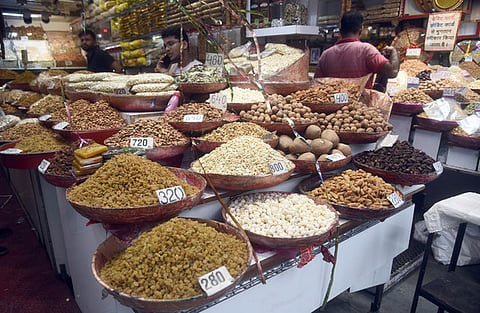

CHANDIGARH: Amid the heightened tensions between India and Pakistan following the Pahalgam terror attack, the closure of the Attrari-Wagah border has hit the trade of dry fruits from Afghanistan to India, which may result in the domestic prices of these commodities by 10 to 25 per cent.
Despite years of war and civil strife, Afghanistan continues to be the largest source of dry fruits for India.
Speaking to TNIE, National President of the Federation of Grocery and Dry fruit Commercial Association, Anil Mehra said that since April 22, after the closure of the Attari-Wagah border, no trucks carrying dry- fruits are coming from Kandahar in Afghanistan to Attari.
"Some 50 trucks are standing at the Wagah border on Pakistan side. As many as 100 trucks enroute from Afghanistan to Attari in India carrying 35 to 40 tonnes of dry fruits will have to be diverted back. The dry fruit mainly comes from Kandahar in Afghanistan and some items from Kabul," he said.
Most of the dry fruit approximately 90 per cent has come in January and February as there is no storage facility in Afghanistan and it is perishable item. While before the Pahalgam terror attack on a average daily 15 to 20 trucks come to Attari in the off season and in the season which starts from July 15 till Diwali some 40 to 60 trucks come per day,’’ he said.
Mehra added that the prices of the dry fruits have already risen by 10 to 25 per cent, as almonds which were costing Rs 750 to Rs 775 per kg are now selling at Rs 850 per kg a hike of Rs 70 to Rs 75 per kg also Pistachios which are selling between Rs 1,800 to Rs 2, 200 per kg depending upon the quality have gone up by 15 percent.
In a statement the foreign ministry of Taliban Government stated that that the closure of the only operational land border crossing has effected trade between India and Afghanistan via Pakistan. `` This is one of the Afghanistan’s shortest and cheapest transit routes for trade with India and Afghanistan Chamber of Commerce and Investment has said that the annual trade via this route is $ 500 million."
From last year April to January this year, Indian exports to Afghanistan were $264.15 million, while imports stood at $591.49 million. Out of this, India’s inbound shipments of dry fruits stood at $358 million. During this period, India’s fruits and nuts import from Pakistan was $0.08 million. The main goods imported from Afghanistan through Attari include dried figs, asafoetida, saffron, dried apricots, pistachios and raisins.
Another importer said that the closure of the land route will definitely impact imports of dry fruits from both Pakistan and Afghanistan. `` We will get the nuts but it would come from countries like UAE, Iran, and Iraq as these would act as an alternate route for Afghan dry fruits.’’
Following the terror attack in Pahalgam, India immediately closed the Attari border. In retaliation, Pakistan also announced that all trade with India, including to and from any third country through Pakistan, is suspended forthwith.
At present, India is trading with Afghanistan only via the Attari-Wagah border and Pakistan’s suspension of trade will impact domestic exports and imports to Kabul.
After the Pulwama terror attack in 2019, in which 44 CRPF personnel were killed, the Indian government had restricted import from Pakistan by hiking the custom duty to 200 per cent, from a mere 5 per cent. Since then, import of goods from Pakistan has almost stopped. In August 2019, when New Delhi abrogated Article 370, which gave special status to the erstwhile state of Jammu and Kashmir, Pakistan had ceased all trade relations with India.